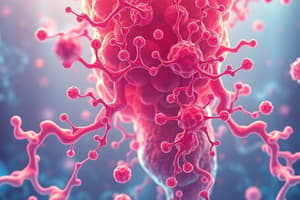Podcast
Questions and Answers
What is a key factor that impacts drug response related to genetic factors?
What is a key factor that impacts drug response related to genetic factors?
- Patient-specific genetics (correct)
- Drug potency
- Drug interaction severity
- Receptor binding affinities
Which drug administration route allows for the most rapid effect?
Which drug administration route allows for the most rapid effect?
- Oral
- Subcutaneous
- Intravenous (correct)
- Intramuscular
What does Therapeutic Drug Monitoring primarily aim to achieve?
What does Therapeutic Drug Monitoring primarily aim to achieve?
- Ensure drug levels are below therapeutic ranges
- Identify potential patient allergies
- Maximize drug side effects
- Maintain optimal drug concentrations in the blood (correct)
Which of the following best describes drug toxicity?
Which of the following best describes drug toxicity?
In the context of drug interactions, pharmacokinetic interactions primarily involve which aspect?
In the context of drug interactions, pharmacokinetic interactions primarily involve which aspect?
Which consideration is crucial for safe drug administration?
Which consideration is crucial for safe drug administration?
What type of studies are essential for evaluating drug safety before its use in humans?
What type of studies are essential for evaluating drug safety before its use in humans?
Which patient-specific factor does NOT impact drug response?
Which patient-specific factor does NOT impact drug response?
Which of the following accurately describes the process of drug metabolism?
Which of the following accurately describes the process of drug metabolism?
What is the primary purpose of pharmacodynamics in pharmacology?
What is the primary purpose of pharmacodynamics in pharmacology?
In pharmacology, what defines a drug agonist?
In pharmacology, what defines a drug agonist?
Which factor does NOT influence the absorption of drugs into the bloodstream?
Which factor does NOT influence the absorption of drugs into the bloodstream?
What is the primary organ responsible for the process of excretion of drugs and their metabolites?
What is the primary organ responsible for the process of excretion of drugs and their metabolites?
Which statement best describes drug affinity?
Which statement best describes drug affinity?
Which of the following processes involves the alteration of drug effects due to the presence of other molecules?
Which of the following processes involves the alteration of drug effects due to the presence of other molecules?
What role does first-pass metabolism play in drug pharmacokinetics?
What role does first-pass metabolism play in drug pharmacokinetics?
Flashcards
Pharmacology
Pharmacology
The study of drugs and their interactions with living organisms.
Drug action
Drug action
The specific molecular mechanism by which a drug produces its effects.
Drug effects
Drug effects
The observable changes in the body caused by a drug.
ADME
ADME
Signup and view all the flashcards
Absorption (Pharmacokinetics)
Absorption (Pharmacokinetics)
Signup and view all the flashcards
Distribution (Pharmacokinetics)
Distribution (Pharmacokinetics)
Signup and view all the flashcards
Metabolism (Pharmacokinetics)
Metabolism (Pharmacokinetics)
Signup and view all the flashcards
Excretion (Pharmacokinetics)
Excretion (Pharmacokinetics)
Signup and view all the flashcards
Pharmacodynamics
Pharmacodynamics
Signup and view all the flashcards
Drug Targets
Drug Targets
Signup and view all the flashcards
Agonist
Agonist
Signup and view all the flashcards
Antagonist
Antagonist
Signup and view all the flashcards
Drug Modulator
Drug Modulator
Signup and view all the flashcards
Drug Response Factors
Drug Response Factors
Signup and view all the flashcards
Receptor Binding Affinity
Receptor Binding Affinity
Signup and view all the flashcards
Drug Potency
Drug Potency
Signup and view all the flashcards
Drug Efficacy
Drug Efficacy
Signup and view all the flashcards
Patient-Specific Factors
Patient-Specific Factors
Signup and view all the flashcards
Drug Interactions
Drug Interactions
Signup and view all the flashcards
Oral Drug Administration
Oral Drug Administration
Signup and view all the flashcards
Intravenous (IV) Administration
Intravenous (IV) Administration
Signup and view all the flashcards
Intramuscular (IM) Administration
Intramuscular (IM) Administration
Signup and view all the flashcards
Subcutaneous (SC) Administration
Subcutaneous (SC) Administration
Signup and view all the flashcards
Topical Drug Administration
Topical Drug Administration
Signup and view all the flashcards
Drug Toxicity
Drug Toxicity
Signup and view all the flashcards
Adverse Drug Reactions (ADRs)
Adverse Drug Reactions (ADRs)
Signup and view all the flashcards
Drug Safety
Drug Safety
Signup and view all the flashcards
Therapeutic Drug Monitoring (TDM)
Therapeutic Drug Monitoring (TDM)
Signup and view all the flashcards
Clinical Pharmacology
Clinical Pharmacology
Signup and view all the flashcards
Study Notes
Introduction to Pharmacology
- Pharmacology is the study of drugs and their interactions with living organisms.
- It encompasses drug action, drug effects, and the use of drugs to treat diseases.
- Pharmacology involves understanding how drugs are absorbed, distributed, metabolized, and excreted (ADME).
- Drug action is the specific molecular mechanism by which a drug produces its effects.
- Drug effects are the observable changes in the body caused by a drug.
Drug Targets and Mechanisms
- Many drugs exert their effects by interacting with specific molecular targets within the body.
- These targets include proteins like enzymes, receptors, ion channels, and transporters.
- Drugs can act as agonists (mimicking the action of natural molecules), antagonists (blocking the action of natural molecules), or modulators (altering the function of the target).
- Interactions between drugs and targets can be influenced by factors such as drug concentration, affinity, and the presence of other molecules.
- Drug design involves identifying or synthesizing a drug candidate that adheres to specific chemical properties, bioavailability, pharmacokinetics, and efficacy guidelines.
Pharmacokinetics
- Pharmacokinetics describes the movement of drugs within the body.
- Key processes include:
- Absorption: The process by which a drug enters the bloodstream from its site of administration. Factors influencing absorption include route of administration, drug formulation, and physiological factors.
- Distribution: Once absorbed, drugs distribute throughout the body via the blood. This involves crossing biological membranes, binding to proteins, and compartmentalization.
- Metabolism: The process by which a drug is chemically altered in the body, often by enzymes like cytochrome P450s in the liver. Metabolites can be more or less active than the original drug. First-pass metabolism significantly impacts the bioavailability of orally administered drugs.
- Excretion: The process of eliminating the drug or its metabolites from the body. This primarily occurs through the kidneys, but also via the liver, lungs, and other routes.
Pharmacodynamics
- Pharmacodynamics describes the effects of drugs on the body.
- It focuses on the relationship between drug concentration and response.
- Factors that impact drug response include:
- Receptor binding affinities
- Drug potency and efficacy
- Patient-specific factors like age, gender, genetics, and pre-existing conditions
- Drug interactions: Simultaneous use of multiple drugs may affect the efficacy or safety of either drug, increasing the risk of adverse events.
Drug Administration and Routes
- Drugs are administered in various ways to target specific needs or achieve specific outcomes.
- Common routes include:
- Oral (most common, convenient): Absorption occurs in the gastrointestinal tract.
- Intravenous (IV): Direct administration into a vein allows for rapid drug delivery and precise control of dose.
- Intramuscular (IM): Injection into muscle tissue; suitable for certain drugs that might cause irritation if injected into a vein.
- Subcutaneous (SC): Injection under the skin.
- Topical: Application to the skin or mucous membranes.
- Drug administration considerations involve factors like drug stability, patient comfort, and potential for side effects.
Drug Toxicity and Safety
- Drug toxicity describes adverse effects that arise from drug use.
- Adverse drug reactions (ADRs) encompass a broad range of undesirable effects.
- Drug safety involves evaluating potential risks and benefits of treatment.
- Preclinical studies(e.g., animal models) and clinical trials (e.g., human testing) are crucial for assessing drug safety prior to human use.
- Monitoring patients during and after drug use is fundamental to detect and manage potential toxicities appropriately.
- Drug dosage schedules, and patient monitoring, are vital components of safe medication use.
Therapeutic Drug Monitoring (TDM)
- In cases where drug levels need precise control (e.g., certain chemotherapy drugs, immunosuppressants), TDM is used.
- TDM involves regularly measuring drug concentrations in the patient's blood to ensure the desired therapeutic effect is maintained while minimizing toxicities.
- This helps in determining optimal drug dosages and adjusting them as needed.
Clinical Pharmacology
- Focuses on the practical application of pharmacology in clinical medicine.
- Important areas include:
- Selecting the most appropriate drug for a particular condition.
- Determining the correct dosage and frequency.
- Monitoring for adverse effects.
- Consideration of drug interactions, individual variability, and other factors that may influence therapy.
Drug Interactions
- Drugs can interact, affecting the action or toxicity of either drug.
- Interactions can be pharmacodynamic, pharmacokinetic, or both.
- Drug interactions can increase or decrease drug efficacy or lead to unexpected or undesirable effects
Studying That Suits You
Use AI to generate personalized quizzes and flashcards to suit your learning preferences.




